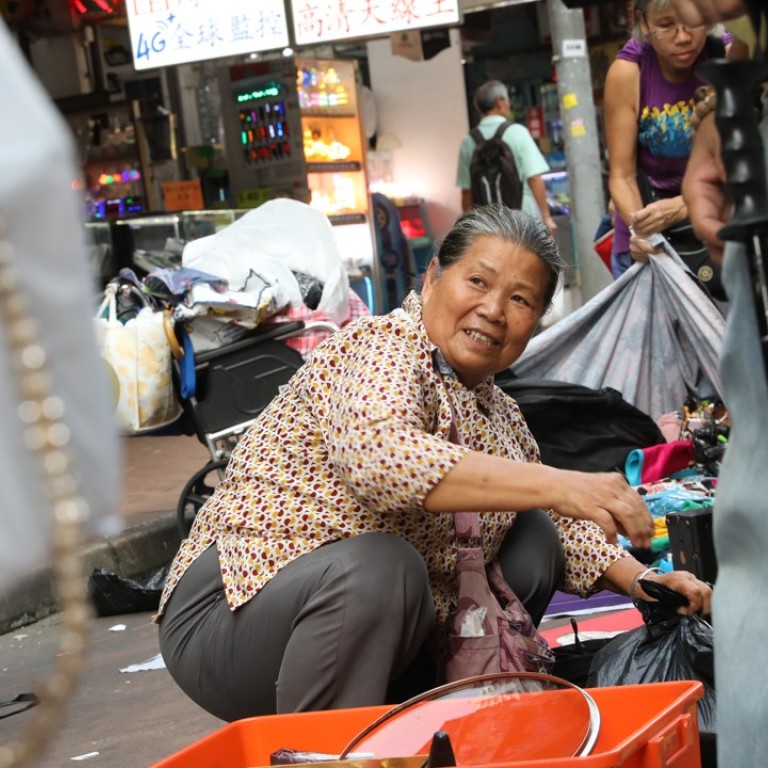
Poor, unskilled and unrecognised: Hong Kong’s ‘street stall grannies’ show city’s elderly are falling through the cracks
Overlooked group is indicator of struggles with an ageing population and lack of proper financial help or post-retirement jobs to stay active
On Apliu Street in Sham Shui Po, Hong Kong’s poorest district, an elderly woman in a pink floral shirt and old trainers sits on a wooden stool before a cart of stacked sundries. She lays out a variety of second-hand goods on the ground.
“These sunglasses look amazing. They’re only HK$15 dollars, brother,” says the woman, who only wants to be known as Hung. She beams at an elderly man perusing a pair of Sony 3D glasses that originally costs HK$100 (US$12.70).
Neither seller nor buyer seems to know what the shades are for, but the deal eventually closes at HK$10.
Most of Hung’s goods are offered for between HK$5 and HK$15, but bargain hunters push for even lower prices. Her items are scavenged from refuse stations and can include anything from plastic toy cars to ceramic Bodhisattva figures.
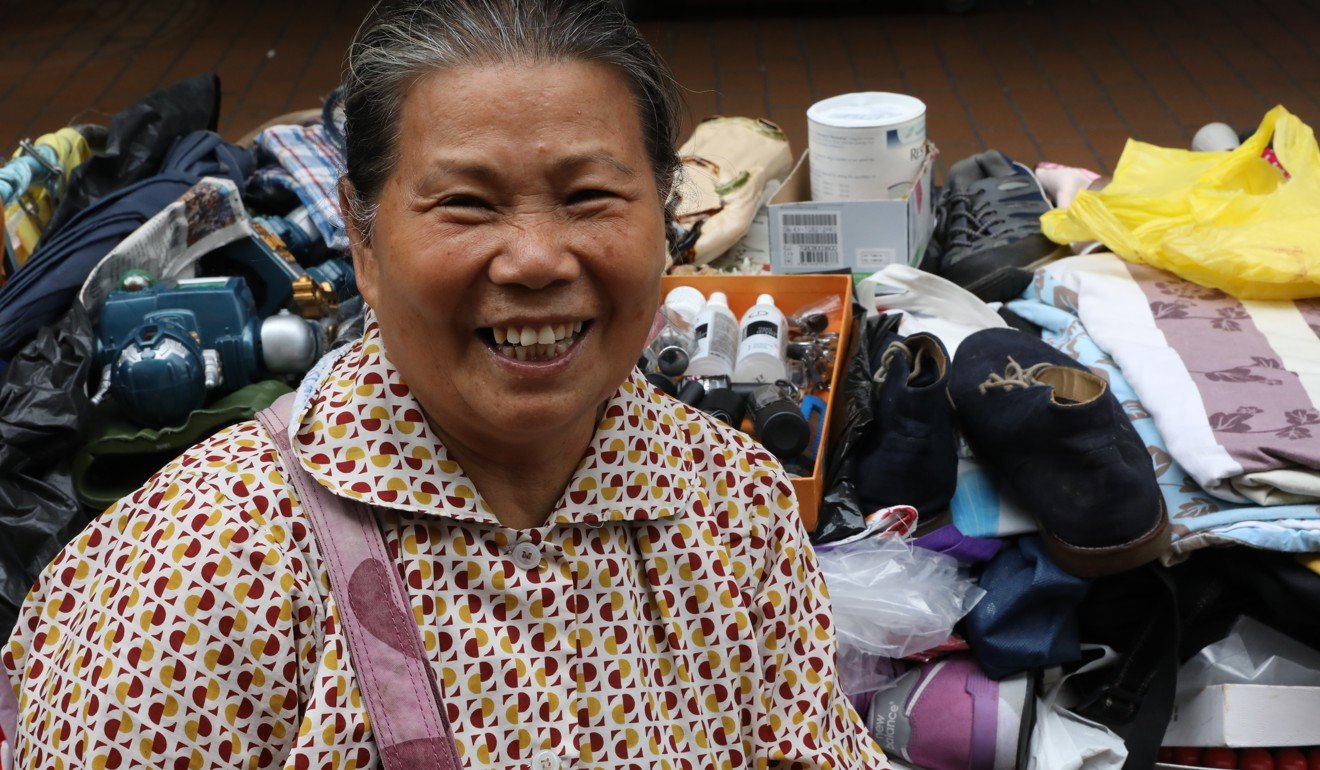
“If I could sell stuff for HK$50, I’d be a billionaire,” Hung says with a chuckle. She adds that she makes anywhere from about HK$30 to HK$300 on a good day. “There is no other place in Hong Kong where you can sell things like this.”
Hung is one of hundreds of senior citizens known as “street stall grannies”. Most of them gather in Sham Shui Po, a district where 24.6 per cent of residents fall below the poverty line. Their area of operation extends from Apliu Street to Pei Ho Street.
It’s a dirty job, but don’t treat them like trash: Hong Kong’s cleaners
Some of the grannies start hawking their wares as early as 5am, while most begin at noon. Others join the fray in the evening and work until midnight.
Their routines reflect Hong Kong’s struggle with a rapidly ageing population, especially those such as Hung who have fallen through the cracks.
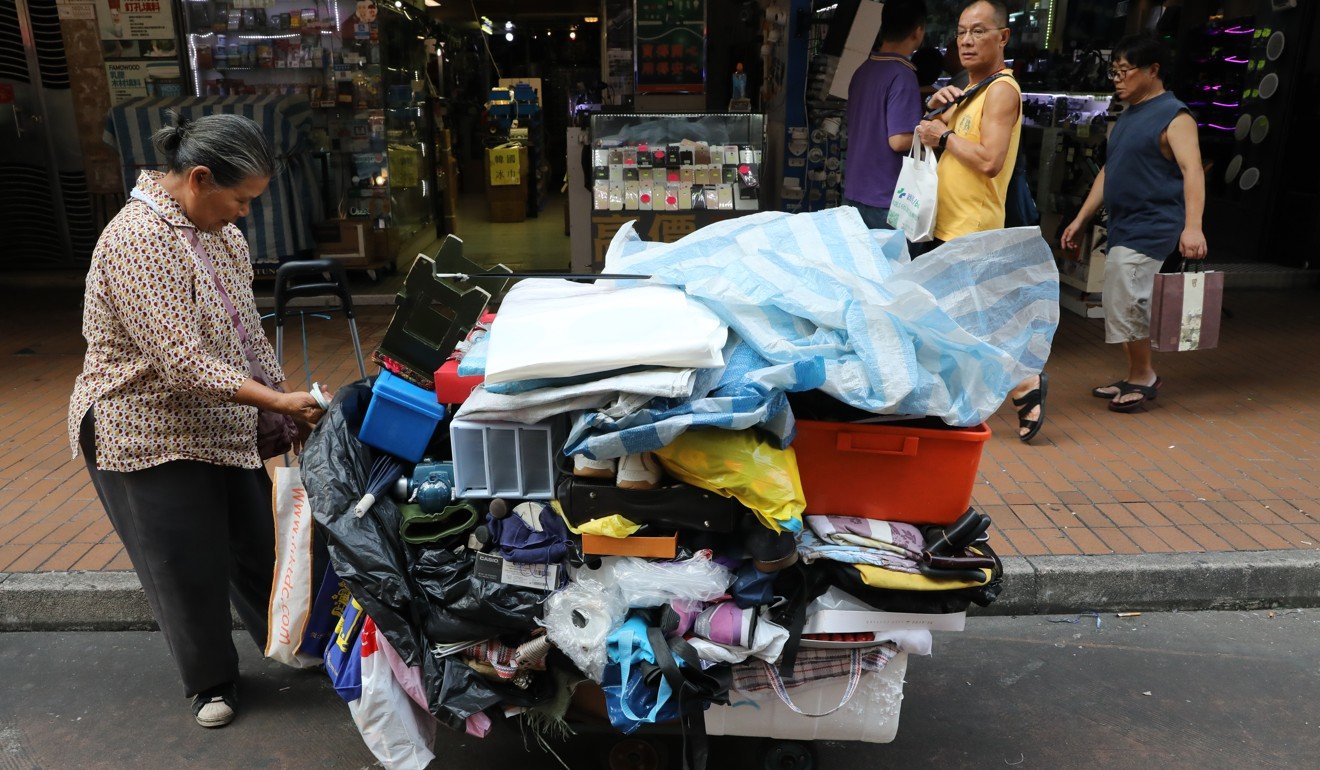
Experts contend the elderly receiving social welfare do not get enough for daily expenses, hence their need to scour for that extra dollar. Others who do not qualify for welfare still face a financial burden, especially with medical expenses increasing in old age.
There are also those who still wish to contribute to society, but are unskilled and cannot find employment opportunities because of their advanced age.
Why seniors are in favour of working in old age – they can’t survive any other way
The latest data obtained from the government’s Hong Kong Poverty Situation Report 2016 showed a rise in the poverty rate of those aged 65 and above. In 2016, there were 337,400 elderly people in Hong Kong who were below the poverty line. The city’s poverty rate for the year was 31.6 per cent, a rise from 30.1 per cent the year before.
For 2016, the poverty line was set at under HK$4,000 (US$512) in monthly earnings for single people, HK$9,000 for a two-person household and HK$15,000 for three people.
Among elderly people living in poverty in 2016, about 12.4 per cent hailed from households receiving the government’s comprehensive social security assistance. As for those not receiving such help, 97 per cent were economically inactive.
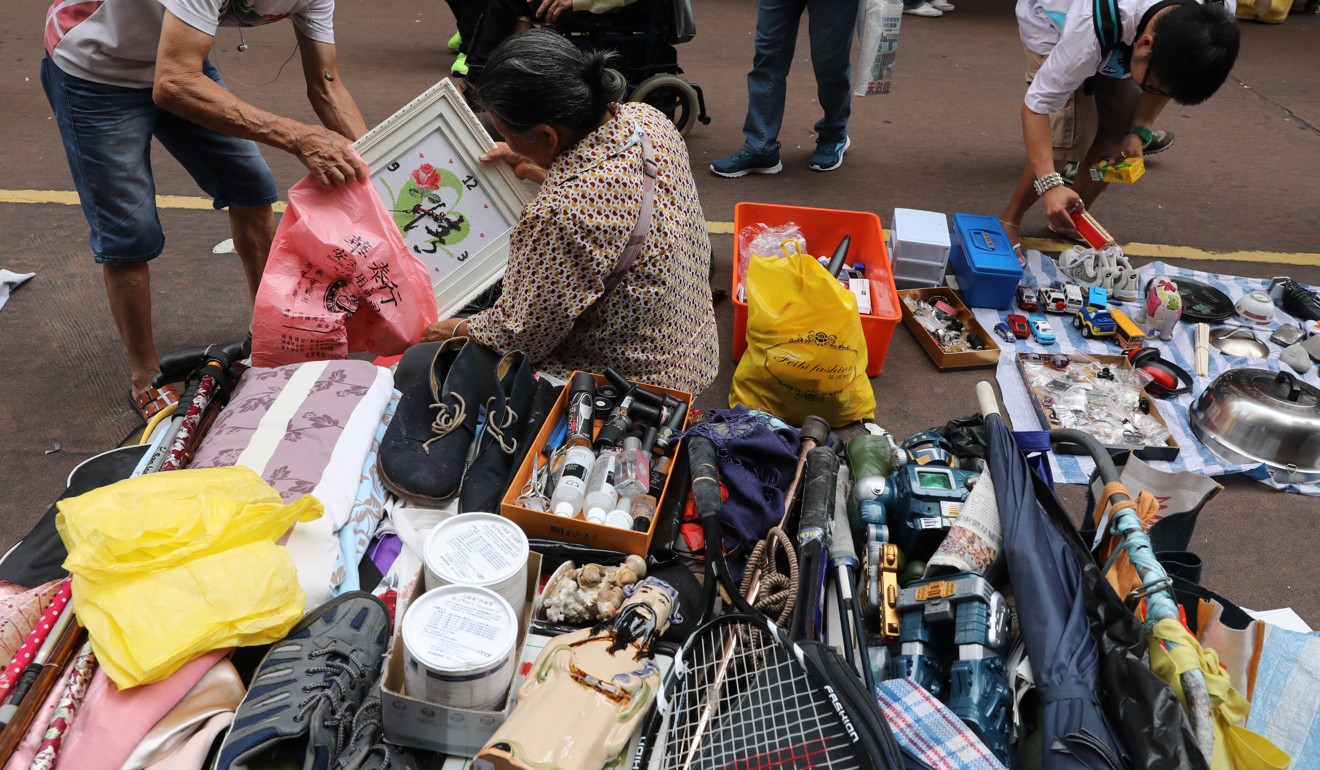
A cat-and-mouse game
The activities of Hung and other vendors are not reflected in official employment statistics.
Under local law, street vendors are considered illegal hawkers and can be prosecuted for obstructing public space or convicted of unlicensed hawking. Penalties include a maximum fine of HK$5,000.
Earlier in June, an elderly woman surnamed Ng was arrested for just such an undertaking. The woman, in her 80s, was reportedly surrounded by government officers and police. She later said she suffered bruises to her waist and calves after being dragged by authorities. She was released on bail, but her cart and items were confiscated.
Ng’s case sparked public fury over what was seen as callous treatment by officials and disrespect for the elderly.
Lawmakers and activists urged authorities to review policies to allow the elderly to remain in the workforce or provide those who are out of work with better social allowances.
I can’t find other jobs. They won’t hire me because I’m too old now
Yet the long arm of the law does not deter Hung.
“I can’t find other jobs. They won’t hire me because I’m too old now,” she says with a sigh, recalling earlier days when she worked at a clothes factory.
Hung has been through the cycle of manual labour: from restaurant and street cleaner to carer at a home for the elderly. But as she reached the retirement age of 65, she was unable to land a job.
She has two sons who live in mainland China, but refuses to take money from them. “They have to support their own family and raise children. It costs a lot,” she explains.
With barely any savings from her low-income jobs through the years, Hung and her husband, 75, who suffers from prostate cancer, get a monthly old-age allowance of HK$1,345 from the government. Her husband spent all his savings on medical treatment.
The money the couple receives is not enough to support monthly expenses for rent, food, clothes, and care for Hung’s mother-in-law. This is why she has turned to selling things on the street, 17 hours a day.
How can Hong Kong get better carers for its ageing population?
On dodging officers, Hung says: “Do what they ask and you’ll be safe. Just be nice to people, and people will be nice to you.” She says most officers greet her and ask her to pack up and move along without much fuss.
The Food and Environmental Hygiene Department stresses it has guidelines for officers in the handling of elderly or disabled persons and that summonses will only be issued if verbal warnings go unheeded. A spokesman says there were 6,402 prosecutions against illegal hawkers in 2017, a significant decline compared with 15,310 cases from the year before.

But it remains unclear how many of the prosecutions involved hawkers such as Ng.
Democratic Party lawmaker Roy Kwong Chun-yu, who has helped people in 40 similar cases, calls on the community to be more aware of the needs of the elderly.
“Why is it that they risk being fined? Because they have dignity and would rather work for money as long as they’re able to,” he says.
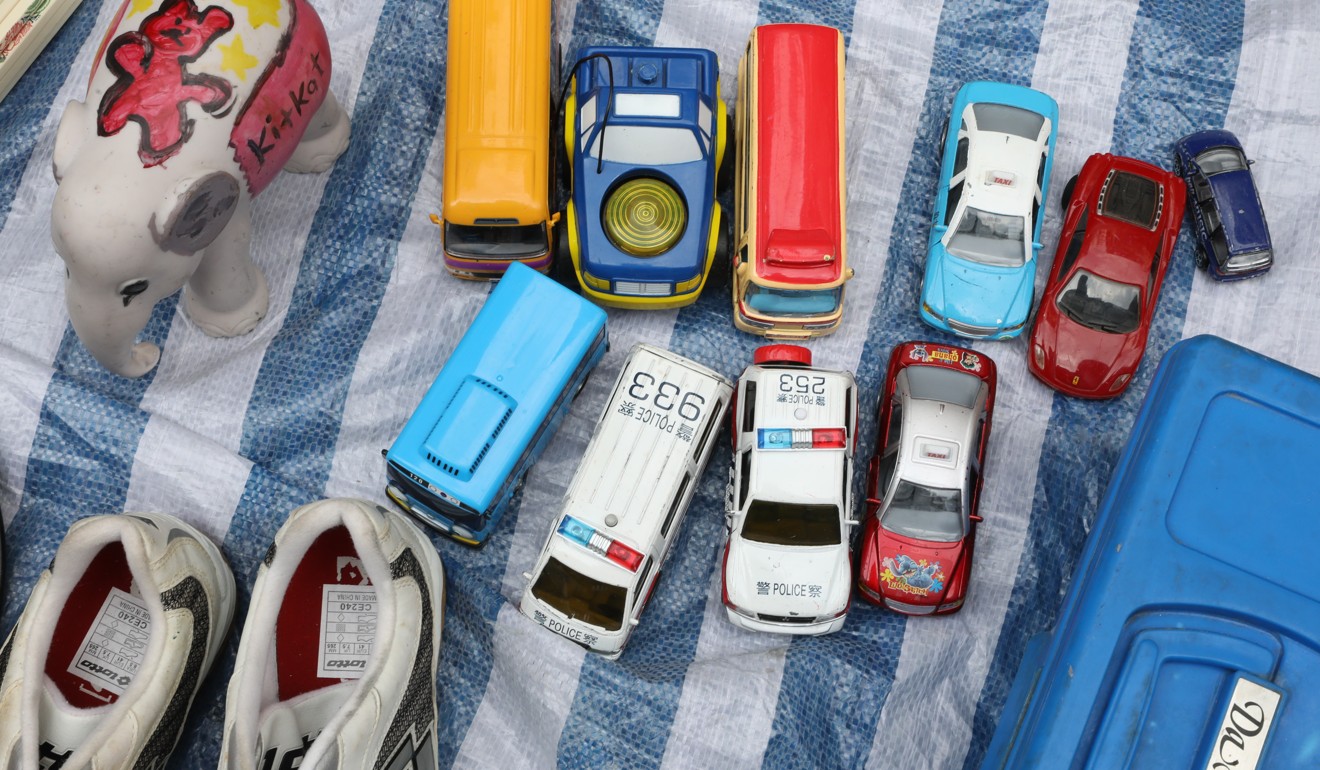
Let them contribute
The need for a productive and meaningful life remains another major motivator for people such as Hung, social workers say.
“They want to be self-sufficient,” observes Peace Wong Wo-ping, chief officer of policy research and advocacy at the Hong Kong Council of Social Service, an umbrella group of welfare organisations. “This doesn’t necessarily mean they’re poor. It just means they want to improve their lives through employment.”
Billions social welfare spending ‘failing to meet needs’ of ageing population
According to government projections, the number of those aged 65 or older will reach 2.58 million by the year 2064, comprising about 35.9 per cent of the city’s total population. Those in the workforce aged between 15 and 65, meanwhile, will shrink to 3.92 million, or 54.6 per cent of the population.
The Elderly Commission, a government policy advisory body, has said it is exploring further options, including providing suitable work for those who have retired.
“We push for a healthy and sympathetic employee-employer relationship, so if they’re only able to work part-time, employers should support that,” commission chairman Dr Lam Ching-choi says.
Noting the subsidies available for the elderly, including the normal and higher old-age living allowances, Wong from the council suggests relaxing the asset limits to help more of those in need.
Hong Kong has a universal old-age allowance for those above 70, which Hung is receiving. But there is also the normal old-age living allowance, available for those whose assets do not exceed HK$499,000 for married couples and HK$329,000 for single people. And the higher old-age allowance puts asset limits at HK$218,000 for married couples and HK$144,000 for single people.
Wong argues that the ceilings are too low. She says it is hardly surprising that some elderly people will have saved such totals in their lifetimes. Yet these amounts are hardly enough given rising costs of living and the need to save up for rainy days such as in health emergencies.
“That’s why some want to re-enter the workforce, so they have a steady monthly income, even if it’s just a few hundred dollars more,” Wong says.
He says more societal awareness is needed concerning people in Hung’s straits, and one way to lift the stigma attached to them would be to set up legitimate avenues for them to earn extra cash.
“The best way to make them feel useful even as they age would be to have bazaars in districts like Sham Shui Po.”
The best way to make them feel useful even as they age would be bazaars
A department spokesman says the administration will keep an open mind towards such proposals and consider a district-led approach. It will also back such plans as long as they are in line with food safety, environmental hygiene and public access requirements.
“They have contributed to the community all their life,” Wong notes. “In return, we need to let them know that we appreciate all that they’ve done. We can do this by becoming a more elderly-friendly society.”
Meanwhile, Hung, in the absence of any legitimacy for her daily travails, finds joy in the little things amid her tough work. She is surprised when, out of nowhere, a stranger hands her a HK$300 portable charger.
“Sometimes, kind people like him give me things to sell. Then I give them a discount in return if he wants to buy other stuff,” she notes, thanking the man.
Breaking out a pot of rice and residual soup from the night before, she settles down to mingle with fellow vendors over a simple meal.
“I’ll work as long as I can,” Hung says. “I just hope more people will support us and come to buy our stuff.”



